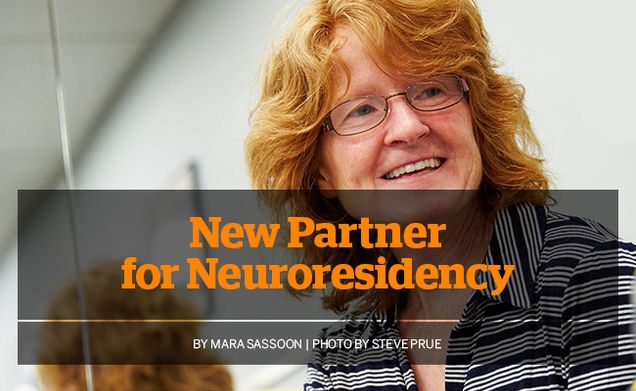New Partner for Neuroresidency

In 2015, Sargent’s Center for Neurorehabilitation is joining with Spaulding Rehabilitation Network’s Medford Outpatient Center “in order to add a broader, extremely high-caliber, rigorous outpatient training across numerous neurological conditions,” says Terry Ellis (above).
When it came time to select the residents for this year’s Neurological Physical Therapy Residency Program, Terry Ellis found herself in a difficult, albeit desirable, situation: she had received 33 applications for just 2 spots.
Physical therapy residency programs, which offer specialized training to develop expert clinicians, have become increasingly popular. When Sargent’s Center for Neurorehabilitation (CNR)—the first in New England—enrolled its initial group of students in 2011, there were just a few other neuroresidency programs in the United States. Now there are more than 25.
“In the fast pace of health care, it’s difficult to get mentoring and training in an everyday job,” says Ellis (MED’05), an assistant professor of physical therapy & athletic training and director of CNR. “So, physical therapy is moving more toward the medical model, where there is specialized residency training.”
Residents in Sargent’s neuroresidency program perform approximately 30 hours of clinical training per week, so it’s critical to have top-notch clinical partners, Ellis says. The program’s collaboration with Beth Israel Deaconess Medical Center (BIDMC) provides residents with experience in an acute neurology rotation and in intensive care. And in 2015, CNR is joining with a second prestigious institution—Spaulding Rehabilitation Network’s Medford Outpatient Center—“in order to add a broader, extremely high-caliber, rigorous outpatient training across numerous neurological conditions,” says Ellis. “We’re very excited about the partnership.”
The excitement is mutual. Lisa Pezzini, the neurology program clinical supervisor and a director in Spaulding’s Brace and Prosthetics Clinics, worked closely with Ellis to make the collaboration a reality. “Terry is amazing,” she says, “and we’re delighted to collaborate with an academic institution as wonderful as BU.” In what Ellis calls a “full-circle” scenario, a graduate of Sargent’s neuroresidency program, Sara Crandall (’10,’12), now works at Spaulding Medford and is a mentor to the 2015 residents.
“We do research, clinical care, and education all in the same space. So there’s never a gap between findings and translation to clinical practice.”
—Terry Ellis
During the yearlong program, the residents divide their time between BIDMC and Spaulding, spending six months at each institution. A partnership with California’s Neurologic Physical Therapy Professional Education Consortium, which brings together neuroresidency programs from across the country, allows the residents to participate in didactic training and build their professional network. Residents also gain teaching experience by instructing in the lab component of a neurological clinical course in Sargent’s Doctor of Physical Therapy program.
The residents assist Ellis in her research at CNR, which focuses on using early exercise intervention to reduce disability and improve physical function in individuals with Parkinson’s. “The unique thing is, we do research, clinical care, and education all in the same space. So there’s never a gap between findings and translation to clinical practice,” she says. “Then we do outreach programs to disseminate our research findings to the broader scientific community.”
This year, the residents are helping Ellis conduct a yearlong research trial testing the benefits of a mobile app in making exercise more accessible to people with Parkinson’s. With the app, patients watch videos of their CNR sessions on a mobile device, which allows them to continue their exercises at home. They rate the difficulty and painfulness of each exercise using a sliding scale on the app. “We can now remotely change people’s exercise programs,” Ellis says. “We’ve found that monitoring progress helps people keep going and allows us to optimize the benefit of exercise by increasing the challenge level over time.”
Ellis is confident that the neuroresidency program’s combination of research experience at CNR, diverse clinical exposure at BIDMC, and the new partnership with Spaulding will make the next generation of physical therapists even stronger.